Texas Baptist Heritage Road Trip—A summer to celebrate
When I was a girl, my family took wonderful road trips each summer. We would throw our suitcases and camping gear into the trunk, pile into our wood-paneled Ford Country Squire station wagon, roll down the windows and crisscross the country, eager to experience our nation’s heritage and our Baptist roots.
Our pastor-father and mother were adventurous souls. One of the greatest gifts they gave us as children, next to the saving knowledge of Jesus Christ, was to foster in us a sense of curiosity. God had created such a beautiful world, and we all longed to see every inch of it. He had transformed ordinary lives into heroes of the faith, and we thrilled to hear their stories, see the places where God had worked and find out what had happened next.
In this spirit of grand adventure and with gratitude to God, we welcome you to the Texas Baptist Heritage Road Trip. Over the next 10 weeks this summer, we will visit sites important to our Texas Baptist family history. We will visit different parts of the state, unfolding the history of Baptists and their like-minded friends as they settled the regions and began ministries that endure today. Perhaps there will be a site near your home, so your family can plan a Saturday day trip or a longer route to take in several sites.
Come journey with us to the birthplaces of Baptist heritage in Texas and learn about hardy pioneers whose convictions still amaze and inspire us and upon whose shoulders we do our work today. We hope you will enjoy this series and pack up the generations for some splendid family summer road trip fun! Are your backpacks ready?
Trace Texas Baptist beginnings at Independence
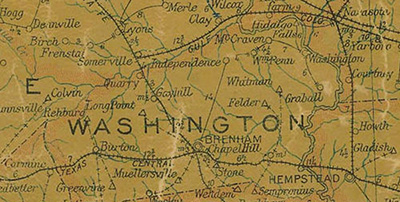 Independence, in Washington County, is called the “Cradle of Texas Baptists.” Once named Cole’s Hill settlement, this is an area rich in Texas history, interlaced with the battles of the Alamo and San Jacinto, the Republic of Texas and early statehood. The historic township of Independence and Washington-on-the-Brazos are neighbors.
Independence, in Washington County, is called the “Cradle of Texas Baptists.” Once named Cole’s Hill settlement, this is an area rich in Texas history, interlaced with the battles of the Alamo and San Jacinto, the Republic of Texas and early statehood. The historic township of Independence and Washington-on-the-Brazos are neighbors.
Three years after Texas became a republic in 1836, Thomas Spraggins, a missionary from Mississippi, called several families together to constitute Independence Baptist Church.
Before long, the church called T.W. Cox as pastor. Early members included James Allcorn and his wife, Lydia, known as the first Baptist convert in Texas, who trusted Christ in the log cabin of Moses Shipman when a visiting preacher, Thomas Hanks, presented the gospel message. The Allcorns joined the new church by baptism in the Little Rocky Creek, which became the church’s baptismal pool for the next century. Nearby, the members built a lovely stone sanctuary in a shaded grove by the creek, 32 feet by 66 feet, with one-foot-thick walls.
In 1840, three churches— Independence, LaGrange, and Travis—formed Old Union Association, the first Baptist association in Texas. One of the new association’s first actions was to form a Texas Baptist Education Society in 1841 for the purpose of opening a Baptist university in Texas. Under the leadership of Robert E. B. Baylor, James Huckins and William Milton Tryon, that dream was realized when, in the fall of 1844, the society petitioned the Congress of the Republic of Texas to charter Baylor University. Republic President Anson Jones signed the act of Congress Feb. 1, 1845 to make it official, almost a year before Texas became the 28th state, Dec. 29, 1845.
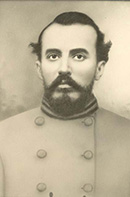 Stephen Decatur Rowe Baylor University opened its doors at Independence in 1846. Henry Lee Graves served as first president, offering a collegiate department the next year and lectures in law in 1849. Under the second president, Rufus C. Burleson, Baylor granted its first degree to Stephen Decatur Rowe in 1854 and separated the school into male and female “departments,” each with different buildings about a mile apart. The county also boasted a Methodist school at Chappell Hill and a Presbyterian co-educational school at Gay Hill.
Stephen Decatur Rowe Baylor University opened its doors at Independence in 1846. Henry Lee Graves served as first president, offering a collegiate department the next year and lectures in law in 1849. Under the second president, Rufus C. Burleson, Baylor granted its first degree to Stephen Decatur Rowe in 1854 and separated the school into male and female “departments,” each with different buildings about a mile apart. The county also boasted a Methodist school at Chappell Hill and a Presbyterian co-educational school at Gay Hill.
Once the first Baptist state convention was formed in Anderson, in 1848, Independence Baptist Church served as host to 10 of its first 38 meetings. Fire destroyed the church building Feb. 11, 1872; however, some of the old walls remained, and the church rebuilt later the same year. Many of the original furnishings were saved as well, including the family pew of Sam Houston—upon which he carved his initials.
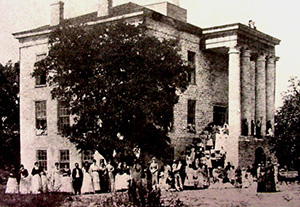 Baylor Female College Other smaller Baptist conventions and associations formed in the 1850s and worked separately in their regions. But in 1886, the Baptist bodies joined in unity to accomplish their work. In that significant year, the two major Baptist schools merged to become Baylor University in Waco, the Baylor Female College moved to Belton (eventually to become the University of Mary Hardin-Baylor in 1934), the two largest Baptist bodies became the Baptist General Convention of Texas, and the two major Baptist newspapers merged to become one voice.
Baylor Female College Other smaller Baptist conventions and associations formed in the 1850s and worked separately in their regions. But in 1886, the Baptist bodies joined in unity to accomplish their work. In that significant year, the two major Baptist schools merged to become Baylor University in Waco, the Baylor Female College moved to Belton (eventually to become the University of Mary Hardin-Baylor in 1934), the two largest Baptist bodies became the Baptist General Convention of Texas, and the two major Baptist newspapers merged to become one voice.
Some of the Baylor ruins still stand in Independence, including the columns of the women’s building and the dining hall foundation. You can also see and tour several other landmarks in Independence. Not far from the church cemetery, explore Old Independence Cemetery, where early settlers—many Baptists among them—were buried. Their names are among the earliest Baptist pioneers in Texas.
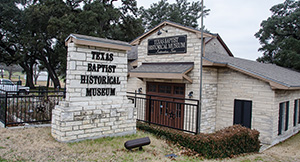 In Independence, visit the Texas Baptist Historical Museum, located in the historic church building. The museum contains a wonderful collection of Texana memorabilia and a photographic display of Texas Baptist history. Sit in Sam Houston’s pew in the church sanctuary, note his initials carved on the pew in front of his seat, and visit the site of his baptism down the road on the creek.
In Independence, visit the Texas Baptist Historical Museum, located in the historic church building. The museum contains a wonderful collection of Texana memorabilia and a photographic display of Texas Baptist history. Sit in Sam Houston’s pew in the church sanctuary, note his initials carved on the pew in front of his seat, and visit the site of his baptism down the road on the creek.
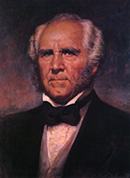 Sam Houston Find the church bell, given by Sam Houston’s mother-in-law, Nancy Moffette Lea, in celebration of Sam’s conversion and baptism. She sold her silverware to pay for its casting in 1856, and it hung in the tower near the church for decades.
Sam Houston Find the church bell, given by Sam Houston’s mother-in-law, Nancy Moffette Lea, in celebration of Sam’s conversion and baptism. She sold her silverware to pay for its casting in 1856, and it hung in the tower near the church for decades.
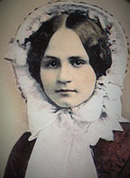 Margaret Lea Houston Margaret Moffette Lea Houston outlived her famous husband but died of yellow fever in 1867 when an epidemic swept through Independence. Walk across the street from the church and visit the site where she was buried beside her mother, Nancy Lea.
Margaret Lea Houston Margaret Moffette Lea Houston outlived her famous husband but died of yellow fever in 1867 when an epidemic swept through Independence. Walk across the street from the church and visit the site where she was buried beside her mother, Nancy Lea.
Nearby, Washington-on-the-Brazos was the site of the convention that declared Texas a free and independent republic on March 2, 1836, just four days before the battle of the Alamo was fought in San Antonio. At one time the head of the steamboat navigation on the Brazos River, Washington-on-the-Brazos also served as the capital of the Republic of Texas. A Baptist church was established here in 1837 by Z. N. Morrell and was reconstituted in 1841 by William Tryon, R.E.B. Baylor and T.W. Cox.
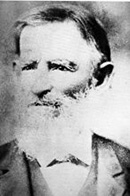 Noah T. ByarsWashington-on-the-Brazos also is home to the Texas State Park that commemorates the signing of the Texas Declaration of Independence in the unfinished shop of Baptist missionary and preacher Noah T. Byars. Byars (1808-1888) was blacksmith for Gen. Sam Houston’s army and later a preacher and church-planter of 65 Baptist congregations and three Baptist associations in Texas. A remarkable Texas pioneer, Byars was buried in the Greenwood Cemetery in Brownwood.
Noah T. ByarsWashington-on-the-Brazos also is home to the Texas State Park that commemorates the signing of the Texas Declaration of Independence in the unfinished shop of Baptist missionary and preacher Noah T. Byars. Byars (1808-1888) was blacksmith for Gen. Sam Houston’s army and later a preacher and church-planter of 65 Baptist congregations and three Baptist associations in Texas. A remarkable Texas pioneer, Byars was buried in the Greenwood Cemetery in Brownwood.
Other sites of special interest near Independence include the fascinating Antiques Rose Emporium on the outskirts of town and the headquarters of the famous Bluebell Ice Cream, just a few miles away in Brenham.
Independence Baptist Historical Museum
10405 FM 50, Brenham, TX 77833
(979) 836-2929
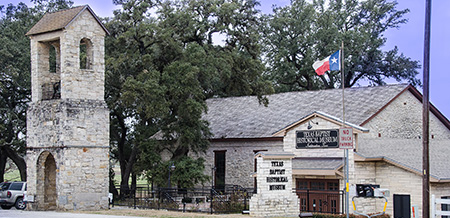 Schedule your visit and tour with Phillip Hassell, pastor of Independence Baptist Church and director of the historical museum at (979) 836-5117 or email phillip.hassell@texasbaptists.org.
Schedule your visit and tour with Phillip Hassell, pastor of Independence Baptist Church and director of the historical museum at (979) 836-5117 or email phillip.hassell@texasbaptists.org.
From Austin or Houston:
Take Hwy 290 to Brenham
Take FM 577 toward Hwy 105 (3 miles)
Turn Right onto TX-105 (Embrey St.). Continue to follow TX-105 (2 miles)
Turn Left onto FM 50 (9 miles) to Independence
From College Station:
Take Raymond Stotzer Pkwy/FM 60. Continue to follow FM 60 (6 miles)
Turn Left onto FM 50 (18 miles) to Independence
From Waco:
Take Hwy 77 south to Cameron (50 miles)
Take Hwy 36 toward Brenham (40 miles)
Turn Left onto FM 390 (9 miles) to Independence
From Dallas/Ft. Worth:
Take Interstate 35E/35W to 35
Take 35 to Waco and Hwy 77
Follow directions from Waco to Independence